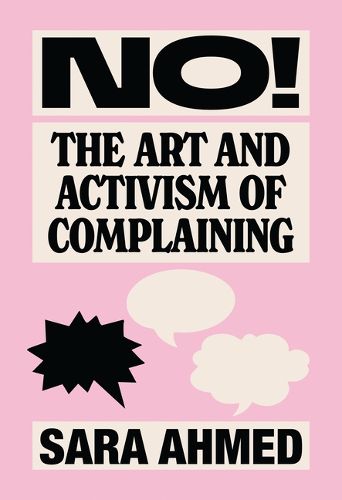Readings Newsletter
Become a Readings Member to make your shopping experience even easier.
Sign in or sign up for free!
You’re not far away from qualifying for FREE standard shipping within Australia
You’ve qualified for FREE standard shipping within Australia
The cart is loading…






An assembly of refusals portraying the radical power of "no" by the renowned scholar and author of The Feminist Killjoy Handbook, Sara Ahmed.
To be heard as complaining is not to be heard, writes Sara Ahmed. In her sweeping exploration of complaint as a means of resistance, Ahmed attunes her "feminist ear" to those who seek to challenge powerful institutions. She shows how complaints can unbury past complaints, getting them out of filing cabinets or from behind closed doors, allowing us to see institutions more clearly--how they work, and for whom they work.
Where complaints live, how complaints are made, who receives them, who buries them and where--Ahmed's accessible, attentive writing brings to life the lessons learned from people knocking at closed doors, teaching us how to collectively resist the glacial weight of institutional power. This book inspires all of us to persist, to say "No!" and to build new collectivities that break down brick walls together.
$9.00 standard shipping within Australia
FREE standard shipping within Australia for orders over $100.00
Express & International shipping calculated at checkout
Stock availability can be subject to change without notice. We recommend calling the shop or contacting our online team to check availability of low stock items. Please see our Shopping Online page for more details.
An assembly of refusals portraying the radical power of "no" by the renowned scholar and author of The Feminist Killjoy Handbook, Sara Ahmed.
To be heard as complaining is not to be heard, writes Sara Ahmed. In her sweeping exploration of complaint as a means of resistance, Ahmed attunes her "feminist ear" to those who seek to challenge powerful institutions. She shows how complaints can unbury past complaints, getting them out of filing cabinets or from behind closed doors, allowing us to see institutions more clearly--how they work, and for whom they work.
Where complaints live, how complaints are made, who receives them, who buries them and where--Ahmed's accessible, attentive writing brings to life the lessons learned from people knocking at closed doors, teaching us how to collectively resist the glacial weight of institutional power. This book inspires all of us to persist, to say "No!" and to build new collectivities that break down brick walls together.